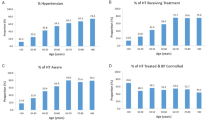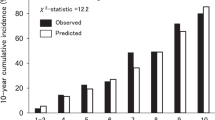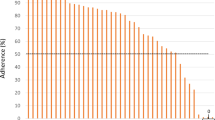Abstract
The May Measurement Month (MMM) programme is a global cross-sectional blood pressure (BP) screening programme. Here we present the combined data for the years 2017–2019 from Oman. BP was measured at various screening sites, according to standard protocol and hypertension was diagnosed if the BP was ≥140/90 mmHg or if the individual was already on antihypertensive medication. A total of 15,679 individuals (mean age 41.1 ± 12.6 years range 18–89 years; 71% male) were screened over the 3-year period. 7702 individuals (mean age 41.8 ± 13.9 years; 71.5% male) had three BP readings. The mean of the last two BP readings was 127.3 ± 17.1 mmHg. 1573 readings were in the hypertensive range (1004 newly diagnosed hypertension). A further 749 individuals were on antihypertensive medications with normal BP readings giving a proportion of 30.1% of the entire cohort being hypertensive. BP was high in 43% of patients on antihypertensive medications, 28.1% of those with previous myocardial infarction, 33.9% of those with previous stroke and 37.6% of the diabetic patients. BP strongly correlated with body mass index (BMI) and age (both p < 0.001), with a large proportion (68.5%) of individuals having high BMI(>25 kg/m2). Arab and South Asian ethnicity was associated with higher BMI and BP (both p < 0.001).Community screening programmes help identify previously undiagnosed hypertension and hypertensives with high BP. They also help to identify those at high cardiovascular risk. More emphasis should be given to monitoring those in high cardiovascular risk categories and high-risk ethnic groups.
This is a preview of subscription content, access via your institution
Access options
Subscribe to this journal
Receive 12 digital issues and online access to articles
$119.00 per year
only $9.92 per issue
Buy this article
- Purchase on SpringerLink
- Instant access to the full article PDF.
USD 39.95
Prices may be subject to local taxes which are calculated during checkout


Similar content being viewed by others
References
Forouzanfar MH, Liu P, Roth GA, Ng M, Biryukov S, Marczak L, et al. Global burden of hypertension and systolic blood pressure of at least 110 to 115 mmHg, 1990–2015. JAMA. 2017;317:165–82.
GBD 2017 Risk Factor Collaborators. Global, regional, and national comparative risk assessment of 84 behavioural, environmental and occupational, and metabolic risks or clusters of risks for 195 countries and territories, 1990-2017: a systematic analysis for the Global Burden of Disease Study 2017. Lancet. 2018;392:1923–94.
Hypertension the silent killer. 2019. https://www.who.int/cardiovascular_diseases/publications/global_brief_hypertension/en/. Accessed 26 Jun 2021.
Nadar S, Lip GY. Secular trends in cardiovascular disease. J Hum Hypertens. 2002;16:663–6.
Beaney T, Schutte AE, Tomaszewski M, Ariti C, Burrell LM, Castillo RR, et al. May Measurement Month 2017: an analysis of blood pressure screening results worldwide. Lancet Glob Health. 2018;6:e736–e743.
Beaney T, Burrell LM, Castillo RR, Charchar FJ, Cro S, Damasceno A, et al. May Measurement Month 2018: a pragmatic global screening campaign to raise awareness of blood pressure by the International Society of Hypertension. Eur Heart J. 2019;40:2006–17.
Beaney T, Schutte AE, Stergiou GS, Borghi C, Burger D, Charchar F, et al. May Measurement Month 2019: The Global Blood Pressure Screening Campaign of the International Society of Hypertension. Hypertension. 2020;76:333–41.
Oman fact file. 2019. https://www.cia.gov/library/publications/the-world-factbook/geos/mu.html. Accessed 26 Jun 2021.
Population in Oman. 2019. https://data.gov.om/OMPOP2016/population?indicator=1000140®ion=1000020-muscat&nationality=1000010-omani. Accessed 26 Jun 2021.
Non communicable diseases in Oman. 2019. https://www.who.int/nmh/countries/omn_en.pdf?ua=1. Accessed 26 Jun 2021.
Al-Lawati J, Sulaiman K, Panduranga P. The epidemiology of acute coronary syndrome in Oman: results from the Oman-RACE study. Sultan Qaboos Univ Med J. 2013;13:43–50.
Hasab AA, Jaffer A, Hallaj Z. Blood pressure patterns among the Omani population. East Mediterr Health J. 1999;5:46–54.
Melgarejo JD, Maestre GE, Thijs L, Asayama K, Boggia J, Casiglia E, et al. Prevalence, treatment, and control rates of conventional and ambulatory hypertension across 10 populations in 3 continents. Hypertension. 2017;70:50–8.
NCD Risk Factor Collaboration (NCD-RisC). Long-term and recent trends in hypertension awareness, treatment, and control in 12 high-income countries: an analysis of 123 nationally representative surveys. Lancet. 2019;394:639–51.
Williams B, Mancia G, Spiering W, Agabiti RE, Azizi M, Burnier M, et al. ESC/ESH Guidelines for the management of arterial hypertension: The Task Force for the management of arterial hypertension of the European Society of Cardiology and the European Society of Hypertension. J Hypertens. 2018;36:1953–2041.
ALNohair S. Obesity in gulf countries. Int J Health Sci. 2014;8:79–83.
Tax on sugary drinks in Oman. 2020. https://muscatdaily.com/Oman/388197/Tax-on-sugary-drinks-starts-today. Accessed 26 Jun 2021.
al-Shammari SA, Khoja TA, al-Maatouq MA, al-Nuaim LA. High prevalence of clinical obesity among Saudi females: a prospective, cross-sectional study in the Riyadh region. J Trop Med Hyg. 1994;97:183–8.
Prasad DS, Kabir Z, Dash AK, Das BC. Abdominal obesity, an independent cardiovascular risk factor in Indian subcontinent: a clinico epidemiological evidence summary. J Cardiovasc Dis Res. 2011;2:199–205.
Malecki EJ, Ewers MC. Labor migration to world cities: with a research agenda for the Arab Gulf. Prog Hum Geogr. 2007;31:467–84.
Lloyd-Jones DM, Hong Y, Labarthe D, Mozaffarian D, Appel LJ, Van HL, et al. Defining and setting national goals for cardiovascular health promotion and disease reduction: the American Heart Association’s strategic Impact Goal through 2020 and beyond. Circulation. 2010;121:586–613.
Lloyd-Jones DM, Evans JC, Larson MG, Levy D. Treatment and control of hypertension in the community: a prospective analysis. Hypertension. 2002;40:640–6.
Wang W. Cardiovascular health in China: low level vs high diversity. Lancet Reg Health West Pac. 2020.
Oto MA, Ergene O, Tokgozoglu L, Ongen Z, Kozan O, Sahin M, et al. Impact of a mass media campaign to increase public awareness of hypertension. Turk Kardiyol Dern Ars. 2011;39:355–64.
Tabassum R, Froeschl G, Cruz JP, Colet PC, Dey S, Islam SMS. Untapped aspects of mass media campaigns for changing health behaviour towards non-communicable diseases in Bangladesh. Glob Health. 2018;14:7.
Wang W, Wise C, Baric T, Black ML, Bittles AH. The origins and genetic structure of three co-resident Chinese Muslim populations: the Salar, Bo’an and Dongxiang. Hum Genet. 2003;113:244–52.
Acknowledgements
We would like to thank all the volunteers who helped screen the patients and especially the nursing directorate of the Sultan Qaboos University Hospital for helping to set up the various blood pressure monitoring booths in the hospital. We also thank Omron Ltd for supplying some of the Blood pressure measuring apparatus for use during the campaign.
Author information
Authors and Affiliations
Contributions
Data collection: Hal-Riyami, IA, SA, AA, H-Allawati, H. Al-Hadi, BP, SM, MM, Data analysis: TB, NRP, SKN. Manuscript writing: H-Al-Riyami, SKN, TB.
Corresponding author
Ethics declarations
Competing interests
The authors declare no competing interests.
Additional information
Publisher’s note Springer Nature remains neutral with regard to jurisdictional claims in published maps and institutional affiliations.
Rights and permissions
About this article
Cite this article
Al-Riyami, H., Al-Shezawi, I., Al-Mashari, S. et al. Prevalence of high blood pressure and cardiovascular risk factors from a community screening programme in the Middle-East; a 3-year analysis of data from the May Measurement Month programme (2017–2019) in Oman. J Hum Hypertens 36, 453–460 (2022). https://doi.org/10.1038/s41371-021-00616-2
Received:
Revised:
Accepted:
Published:
Version of record:
Issue date:
DOI: https://doi.org/10.1038/s41371-021-00616-2
This article is cited by
-
Spotlight on hypertension in the Middle-East
Journal of Human Hypertension (2022)



